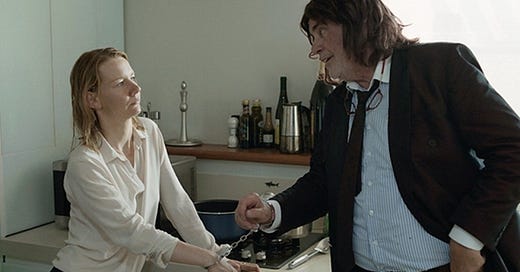Toni Erdmann

Upon seeing the creatively charming, inventively funny and unexpectedly moving “Toni Erdmann” late last year, I urged people to catch the German original before the shorter, inevitably disappointing American remake with Billy Bob Thornton and Kristen Wiig. (Turns out I was half-right on the casting; Jack Nicholson coming out of retirement for this is a big deal, to be sure … if he doesn’t fall back on Just-Jack cheesing.)
You may wonder why the story of an estranged, prank-happy dad paying unwanted visits to his workaholic efficiency-expert daughter while she’s on the job – a sort of modestly dour “Doubtfire” – warrants 162 minutes. Strip out the 42 and it’s no more than a concept comedy albeit perhaps a good one.
And yet such an edit of “Erdmann” would threaten to emphasize its antics (of which there are a joyful, R-rated surplus) to the detriment of its primary delight – the surgically precise, socially satirical way in which it dissects the often maddening complications and contradictions of modern life, work and relationships.
“What do you mean by ‘happiness’? ‘Happy’ is a strong word,” one character counters when pressed to qualify satisfaction. Indeed, “Erdmann’s” central conflict and appropriately untidy resolution concern and combat the notion that happiness is something of which to be inherently skeptical, an anathema in the wake of ambition, a joke that has long since lost its appeal.
There are big-laugh bits involving petit fours, turtle funerals, mail bombs, brunch attire and more, but it’s in the margins of the movie that Winfried (Peter Simonischek) and Ines (Sandra Hüller), and writer-director Maren Ade, wrestle with socially acceptable levels of contentment and in which “Erdmann” finds trenchant, resonant drama.
Gags are the flavor-savoring spice of life through which Winfried distracts himself from an otherwise bland diet of existence. His dog? Frail. His mom? Infirm. His blood pressure? High. His job? Nearly obsolete. His daughter, Ines? She’s had little to do with him for years and would rather it stay that way. “Is that a joke?” Winfried asks Ines on the rare instance when she engages him in conversation – uncertain she’s even capable of telling one.
Were Winfried not always ready with a bit, he would be chomping at one, so he adopts an array of goofy personas as much to alleviate his own ennui as to give others a laugh. Embracing joy is all Winfried has, even if he sometimes only has enough energy for an air hug.
After Winfried’s pooch passes, he tracks Ines to Romania – where she works twice as hard as her male colleagues, with half the credit, to court an oil-magnate CEO as a client. “I’m not a feminist or I wouldn’t tolerate guys like you, Gerald,” Ines quips to one of her co-workers. It’s a snappy confidence sapped the second she’s left to her own devices.
The jocular jokiness that comes effortlessly to Winfried is a lifelong endurance test for Ines – a deflective mechanism to constant mansplaining and the need to carefully choose her words solely because she’s a woman. We come to learn Ines’s life is one of passionless sex, excess drinking and drug use born of desperation to fit into her corporate culture, and aptitude dashed on the rocks of misogyny and sexism.
Ines, of course, has no time for Winfried’s more traditional overtures to steal even a few swatches of her time. In the face of his bits, she has only barbs. Winfried – and the seeming carelessness with which he breezes through life while she barrels ahead – becomes an easy scapegoat for struggles of her own making.
Thus, Winfried resorts to the only course he knows – character comedy – and becomes Toni Erdmann, a life coach who wears tacky suits, dime-store wigs and exaggeratedly false teeth and who descends upon Ines’s social outings with the stealth of a stag hunter. After a while, you’ll scan the corners of Ade’s scenes for Toni – like some sort of weird assimilation of the anxiety of Michael Haneke and the amusements of Judd Apatow – but you’ll never see him coming until he crashes into the frame.
Neither do Ines’s colleagues … or they do and just don’t care simply because they find Toni so ridiculously entertaining. When his shtick starts to work schmoozy wonders on her CEO mark, Ines attunes to Toni’s usefulness and keeps Winfried around.
As familial tension between father and daughter slackens, it also does so to a point where you fear they may lose the rope altogether. Simonischek and Hüller excel as deeply at quiet antagonizing as they do bittersweet bonding. And when the human capital cost of Ines’s work becomes clearer, both she and Winfried must question their respective detachments of humorousness or harshness.
In that sense, Ade understands “Erdmann” is better served as an intrinsic journey of discovery for father and daughter – rather than a trite polemic that falls back on generational stereotypes. Her film generates equally astonishing comic momentum and insights about interpersonal communication.
It’s not just small talk as Winfried absorbs Ines’s corporate lingo; Toni is a direct response to his learning about the art of telling the client what he really wants. Winfried is essentially pretending to be the person Ines needs and not who she knows. There’s no baggage with Toni. He’s a distancing agent that – ironically, steadily, confidently and without cutesy conventionality – brings them closer.
Likewise, as Ines more assertively attacks clods around her, she tacitly asserts to Winfried that sometimes the best weapon against absurdity is more absurdity. It builds to the apex of “Erdmann’s” comic attack – a bit of bawdy, brave boldness that a remake would do best to not excise both for the depth of its laughs and the necessity of its catharsis.
By celebrating meaning in moments that may not, on their face, seem to matter all that much, “Toni Erdmann” earns its epic seriocomic sprawl and establishes itself as one of 2016’s best films.


